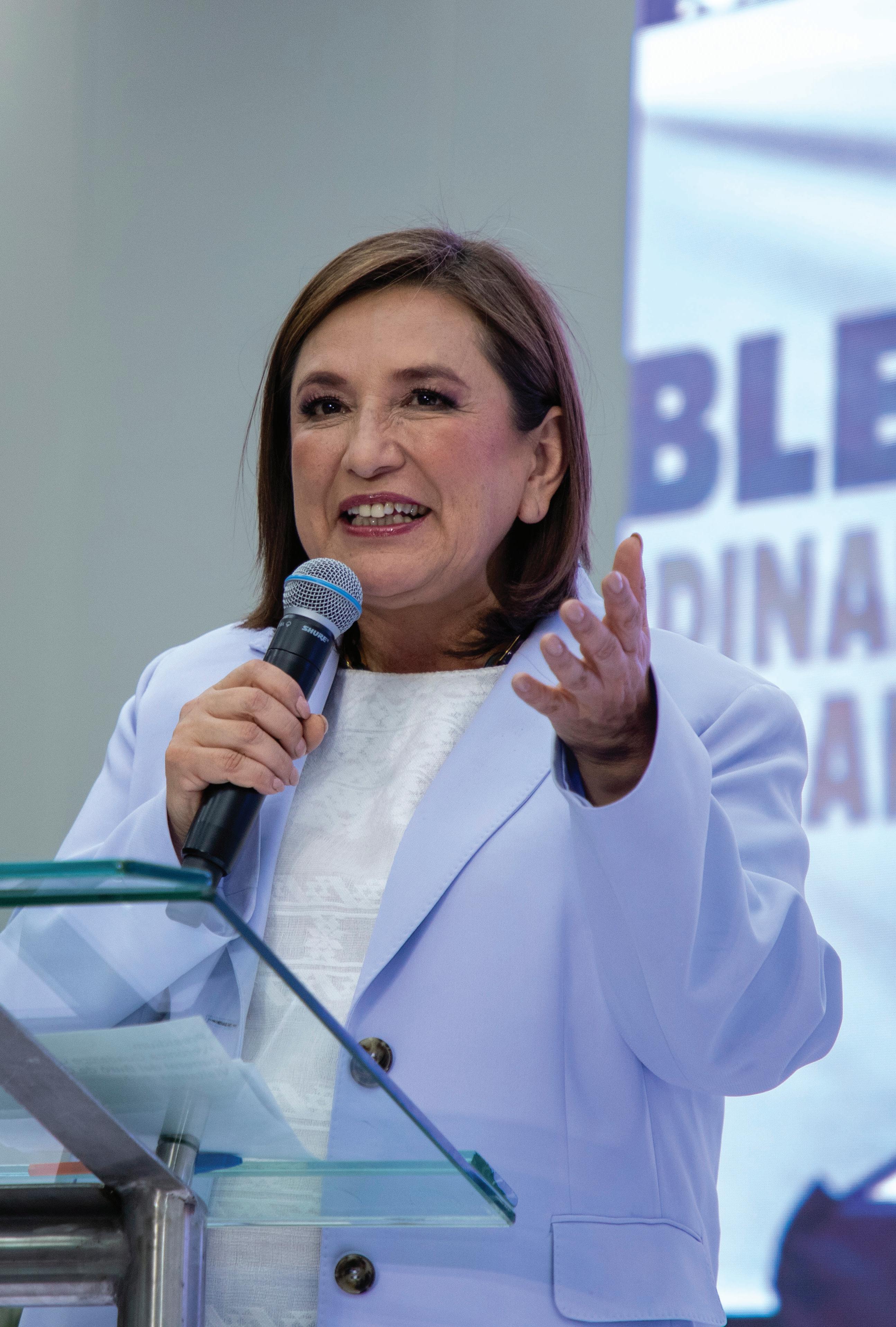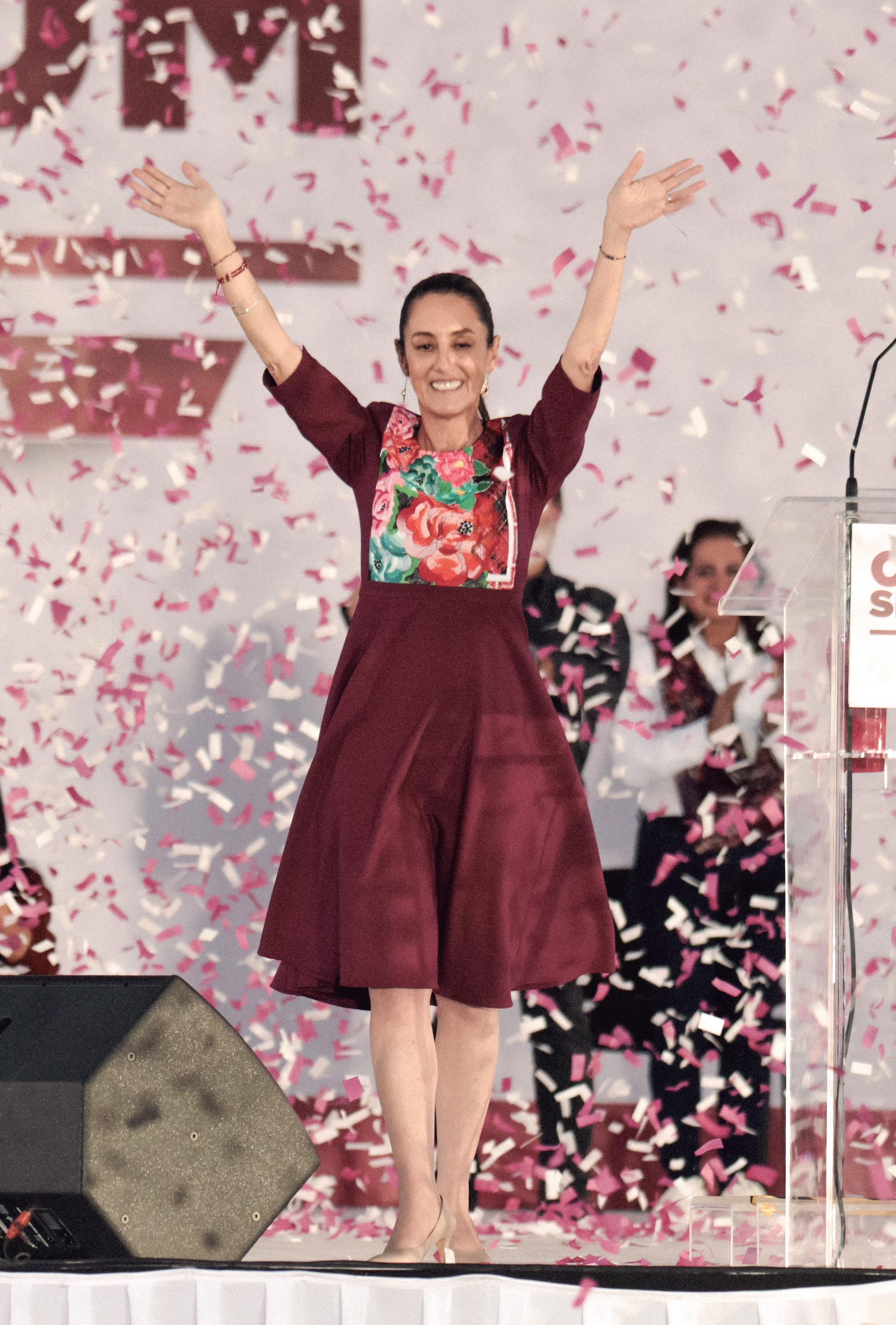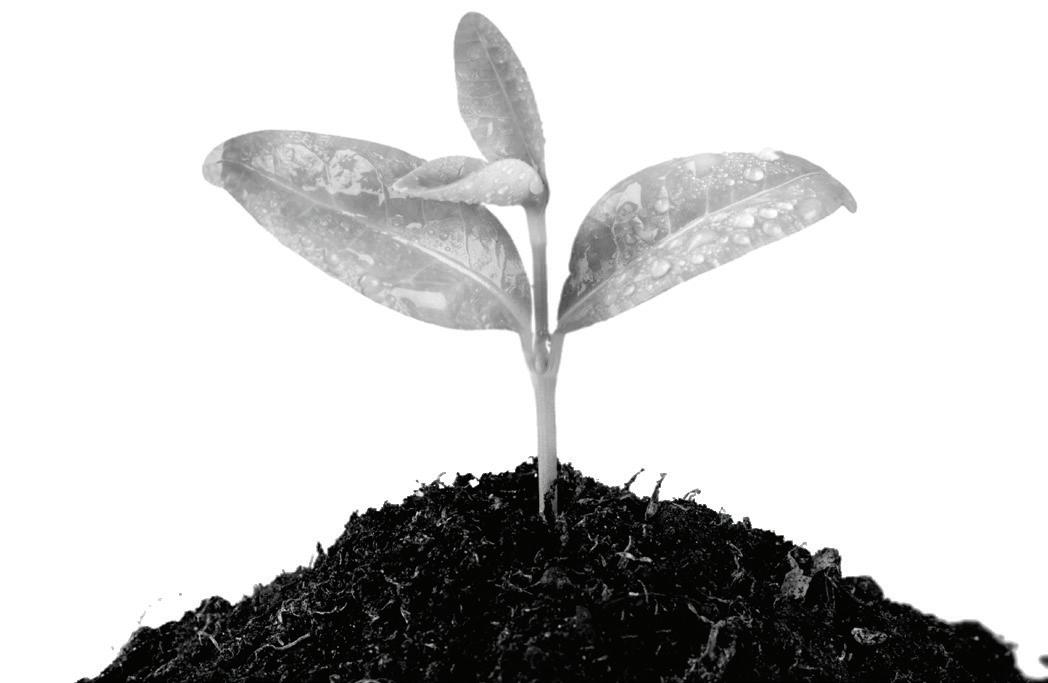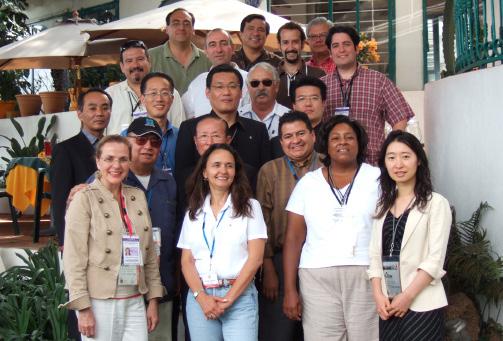




We are only a few days away of Mexico’s General Election. On Sunday, June 2, 2024, millions of Mexicans, both home and abroad, will exercise their right to vote and elect their local, state and federal representatives. Taking into consideration the 32 entities, the States’ Electoral Institutes and the National Electoral Institute (INE) are preparing the largest election in Mexico’s history. There is a total of 629 federal and 20,708 local open positions, including all seats in Federal Congress (128 senators, 500 deputies), the governorships of Chiapas, Guanajuato, Jalisco, Morelos, Puebla, Tabasco, Veracruz and Yucatan, and the president of Mexico. Mexico has over 98 million citizens registered to vote with the right to determine the direction of the nation’s future.
We are grateful to the President of the National Electoral Institute Council, Guadalupe Taddei Zavala, for inviting the U.S.Mexico Chamber of Commerce to participate in the strengthening of Mexico’s democracy by witnessing this historic election with a delegation of electoral observers, or Visitantes Internacionales.
The Chamber’s 5th Electoral Observers Delegation will be composed of 20 individuals, including U.S. citizens, Mexican citizens, and dual citizens. The election will be monitored both in Mexico and at Mexican Consulates in the U.S. as a result of a new voting modality implemented by INE in
collaboration with the Ministry of Foreign Affairs, allowing Mexican citizens to cast their votes at consular representations. At the end of the electoral process, the Chamber’s electoral observers will gather their comments and observations and prepare a report that will be submitted to INE, as well as shared with our members and partners.
To better understand Mexico’s upcoming election, we have prepared this special edition of Alliance Magazine in which we share the reflections of Dr. Lorenzo Córdova Vianello, former President of INE’s Council, on Mexico’s democracy and its current challenges, as well as the platforms of the two main presidential candidates: Xóchitl Gálvez, Coalition “Fuerza y Corazón por México” (PAN, PRI, PRD) and Claudia Sheinbaum, Coalition “Sigamos Haciendo Historia” (Morena, PT, PVEM). We thank the three of them and their teams for their contributions to this special edition.
While it is unknown who the winner of the election will be, it is certain that Mexico will have a female president for the first time in its history, and the Chamber, as always, looks forward to collaborating with her administration to continue working towards a more prosperous North American region, and a stronger partnership and friendship between the U.S. and Mexico.


I. The Transition to Democracy in Mexico1
The democratization process in Mexico is very unique. Unlike cases in other locations, here it was a slow, gradual, and progressive process with changes that, although profound as a whole, never entailed a radical and foundational rupture of the constitutional order.
Although changes covered a plurality of issues, the electoral sphere was a priority, and through a series of subsequent reforms, authentic democratic conditions were gradually built into the elections to allow the periodic and peaceful transition of political power.
In summary, the set of electoral reforms that have taken place since 1977—more than four decades—can be interpreted and systematized based on the fundamental needs that, at every specific historic moment, were intended to be resolved through changes to the rules of access to power. In this sense, four major periods can be identified.2
During the first period, one characterized by an exclusionary, vertical and authoritarian political system— the so-called Revolutionary State forged throughout the prior century—the first need that had to be addressed and resolved was to make the party system more inclusive, opening the door to new political alternatives that previously were not able to compete in elections,
and, additionally, to increase access to the political system so that a growing plurality could participate in the process of public decisionmaking. These were the focus of the first electoral reforms, not exclusively, but in a central way, with decisions that, step by step, allowed a greater dynamism of our party system and an increasingly better reflection of pluralism and ideological diversity in the political representative bodies.
During the second period, and especially after the controversial 1988 election, there was an urgent need to rebuild the electoral system (i.e., the set of electoral rules, institutions, and procedures) in a democratic way in order to establish guarantees for free voting, and to respect the will of the citizens expressed during elections. In short, the intention was to build the structure that would inject confidence in the system and establish credibility and legitimacy in the entire electoral process. The reforms during the first half of the nineties had that purpose and provided the model for electoral institutions and procedures that, in essence, continue to prevail until today with some subsequent changes and adjustments.
During the third period, a new need became
the central objective of the electoral changes: building conditions of equity in campaigns and electoral races. The first audit of campaign expenses of the 1994 election carried out by the Federal Electoral Institute (IFE), the electoral authority at that time, revealed a profound inequity among the parties in the elections. In effect, the ruling party, the PRI, accounted for around 80 percent of the expenditures reported in those elections.
Thus, beyond the very important changes subsequent reforms created that strengthened the independence of electoral bodies from government and other political powers and from the political parties, the distinctive element of these reforms was the creation of mechanisms that would foster conditions of equity in the electoral process.
There were three fundamental mechanisms to achieve this: first, generous public financing for all political parties distributed through a formula established in the Constitution (introduced by the 1996 reform); second, a new model of political communication based on the absolute prohibition of the purchase of political advertising on radio and television, and the use of free-of-charge “state times” allowing the parties to present their political positions to the public; and, third, a set of constitutional changes that prohibited public servants and governments from using public resources to influence the electoral preferences of citizens. These changes also established the obligation to behave with neutrality in electoral practices. Note: The last two points were established in the 2007 reform.
The fourth period standardized how elections were conducted in the country. These reforms ensured that technical quality and institutional guarantees which had been established for federal elections were also present in the local elections in the 32 states. Thus, with the last of the electoral reforms in 2014, a single national electoral system was built that guaranteed the uniformity and standardization of the institutions, rules, procedures and criteria that regulated federal and local elections. The new National Electoral Institute (INE) replaced the Federal Electoral Institute and became the ruling authority of the national electoral system. The INE became the exclusive body in charge of not only conducting federal elections (as the IFE had done until then), but was also responsible for overseeing numerous substantive tasks in local elections and supervising the work of the electoral bodies of each of the federate states—the so-called Local Public Electoral Bodies (OPLE)—in the administration of local elections.
This year’s election is the largest in our history both in terms of the number of potential voters and in the number of public offices on which they will be voting. This year, there will be more than 99 million voters—almost ten million more than those who were able to vote in the 2018 election. In addition to the presidential and federal legislative elections, voters will elect all senatorial and congressional members of the Mexican Congress; further, there will be local elections in the 32 states, for a total of 20,375 federal, state and municipal races throughout the country.
These choices involve many different types of challenges. For reasons of space, I will limit myself to pointing out and briefly outlining what, in my opinion, are the three most important ones:
1. The Internal Cohesion of INE and the Electoral Court.
Although INE survived the attempts of electoral reform proposed by Mexico President Andrés Manuel López Obrador that sought to reinvent the electoral system and replace the National Electoral Institute with a politically-
controlled body, the constitutional reform he presented in 2022 did not receive the necessary votes to be approved in the Chamber of Deputies, and the legal reform approved by the majority Morena party in both legislative chambers was declared unconstitutional by the Supreme Court in 2023 for having seriously violated the legislative procedure.
Today, INE faces the delicate problem of internal governance caused by the inability of its General Council to reach consensus on several issues, including the fact that the executive secretary and heads of 12 of the 16 executive offices operate with formen, instead of being properly appointed as the law established, with the vote of at least eight of the 11 council members under the proposals presented by the presidency.
Additionally, INE has been making a series of improper decisions such as allowing the two main candidates for the presidency of the Republic to start their campaign activities many months before the beginning of the legal timeframe and reducing the amount of fines set by the ruling party after auditing, applying lower penalties than those legally established for serious violations committed by several Morena pre-candidates, among other violations. These improper decisions demonstrate a weak and condescending electoral arbiter with the offenses committed by political parties—particularly Morena—a factor that has caused a significant decline of public confidence towards INE.
On the other hand, the Morena majority in the Senate has avoided appointing two of the seven judges that would join Electoral Court’s Sala Superior (the judicial body that will be in charge as of August 2024) ability to verify the validity of the presidential election and declare the winner of the presidential race. Currently, the inability to be fully functional has serious consequences in terms of political legitimacy that this may have for the election.
Since 2007, the Constitution prohibits any public official from intervening in any electoral process through the use of public resources under his responsibility in any attempt to influence the electoral preferences of citizens, this includes any social communication platform or mechanism. The Constitution also establishes that, during electoral campaigns, government propaganda is prohibited and, therefore, any exaltation of government achievements. This is a radical measure that does not exist in other countries, but in Mexico it has become a fundamental element to achieve fairness in the political contest: the electoral neutrality to which all public officials are obliged.
However, President López Obrador, despite being the one who, as an opposition candidate, most demanded in the past the introduction of such prohibitions, currently, as president, has become the main violator of such prohibitions and, with this, has put at serious risk the fairness of this year’s election.
Although both Former Presidents Felipe Calderón and Enrique Peña Nieto violated such prohibitions on two occasions each during their respective terms in office (as has been determined by IFE and INE), López Obrador has violated these rules on at least 35 occasions, as determined by the Electoral Court. And, as a precaution, the INE ordered the cancellation of dozens of the Mexican government’s social media platforms’ daily press conferences held by the president because they violated the aforementioned prohibitions.

Indeed, on a daily basis, López Obrador continues to publicize the achievements of his administration; he speaks out against opposition parties and candidates and in favor of his party and its candidates. Today, López Obrador’s actions have become the main risk for the fairness of the political contest and for the validity of the election.
3. Violence and the Intervention of Organized Crime.
Violence is a reality that has hurt Mexican society for at least the last 15 years, negatively affecting electoral processes. In the 2018 elections, INE counted 27 candidates and pre-candidates who were murdered, and during the 2021 mid-term elections, the number increased up to 30. In this year’s electoral process, as of the beginning of April—two months before the elections—the number of murders already reached 22 murders according to some reliable media, Violence is the negation of democracy, but it is a reality that has long afflicted the country. The challenge is to ensure that the presence of organized crime does not interfere with the electoral process, that:
• It does not impede the work of INE in the organization and administration of the election, and that the INE can carry out the necessary field work without pressure or interruptions, which, fortunately, has not happened so far. The legendary operational capacity of the Institute continues to give good results;
• Organized crime does not interfere in the development of the campaigns either with illegal financing or by exerting undue pressure or threats. Unfortunately, due to the previously discussed murders which should be verified as soon as possible, there have been some cases of candidates who have declined to participate due to the lack of adequate security conditions in some areas of the country; and
• On election day, there are no threats or risks that would inhibit citizen participation in the exercise of voting. Only with the commitment and responsibility of the authorities to ensure the safety and security of the political actors and voters can the 2024 elections come to fruition.
Dr. Lorenzo Córdova Vianello earned a law degree from the National Autonomous University of Mexico and a Ph.D. in Political Theory from the University of Turin in Italy. He is a Senior Researcher at the Institute for Legal Research at (UNAM), and a professor of Constitutional Theory and Constitutional Law at UNAM Law Faculty.
He was elected Electoral Councilor of the former Federal Electoral Institute (IFE) of Mexico and served from December 2012 to April 2014. Beginning in 2014, Dr. Córdova served as Councilor President of the National Electoral Institute (INE), Mexico’s election management body, a post he held April 2023. He is also a member of the Board of the Institute for Studies for a Democratic Transition (IETD), an important think tank on issues regarding the Mexican process of democratization.
Dr. Córdova has written numerous articles and essays on political theory, electoral law and political science; he has been a columnist with the El Universal newspaper, a frequent contributor to the magazine Voice and Vote, and periodic collaborator at TV Plaform Latinus.
He has been a member of the editorial boards of several journals. From August 2005 to May 2012, he headed UNAM’s Law Faculty Journal. Among his recent books are Derecho y Poder: Kelsen y Schmitt Frente a Frente (Law and Power: Kelsen and Schmitt Face to Face, Fondo de Cultura Económica, 2009); coauthored, La Democracia no se Construyó en un Día (Democracy Has Not Been Built in One Day with Ernesto Núñez, Grijalbo, 2021) and La democracia no se Toca (Don’t Touch Democracy with Ciro Murayama, Planeta, 2023). He also has hosted a number of television programs addressing electoral topics and has received two National Journalism Awards.
¹ The first section of this article is part of the text “Estado, balance y futuro del sistema electoral” included in a book of essays that is about to be published by Cal y Arena, in Mexico.
² This thesis, which I have put forward in several texts, was originally presented in Córdova V., Lorenzo and Ernesto Núñez A., La democracia no se construyó en un día, Grijalbo, Mexico, 2021, pp. 37-52.
The economic integration between the U.S. and Mexico is irreversible: in 2023, Mexico became the number one U.S. trading partner, and the U.S. has been Mexico’s most important trading partner for decades, accounting for almost 80 percent of Mexico’s exports. Given the Chamber’s mission, we focus on trade and economic partnership. However, this vital component of our countries’ prosperity has been partly possible due to our shared geography, history, culture, and family ties. Recent calculations indicate that about 11 million Mexican-born individuals live in the U.S., and over 1.5 million Americans live in Mexico, becoming the first country destination for the American diaspora.
The past and future of both nations are inextricably linked, and what occurs on one side of the shared border impacts the other side; along with socio-economic developments, political occurrences are also of great significance, as local, state, and federal administrations can either halt, maintain, or push forward efforts for the U.S. and Mexico to stay on a collaborative path of prosperity.
Both Mexico and the U.S. celebrate federal elections this year, and for the binational business community, it is vital to stay informed and participate in these processes; for this reason, we dedicate this special edition of Alliance Magazine to Mexico’s upcoming election, and to present to you the presidential candidates in the race to become the President of Mexico for the term 2024-2030.
This year’s elections in Mexico will be the largest in the country’s history, with more than 20,000 positions to be voted in the 32 states, including the renovation of the Federal Congress (Chamber of Senators and Chamber of Deputies), governorships of the States of Chiapas, Mexico City, Guanajuato, Jalisco, Morelos, Puebla, Tabasco, Veracruz and Yucatán, and Mexico’s president.
Here are three presidential candidates in alphabetical order:
• Jorge Álvarez Máynez – Political Party: Movimiento Ciudadano.
• Xóchitl Gálvez Ruiz – Coalition “Force and Heart for Mexico” (Fuerza y Corazón por México). Political parties: Partido Acción Nacional (PAN), Partido Revolucionario Institucional (PRI), Partido de la Revolució Democrática (PRD).
• Claudia Sheinbaum Pardo – Coalition “Let’s Continue to Make History for Mexico’s Presidency” (Sigamos Haciendo Historia para la Presidencia de México).
Political Parties: Morena, Partido del Trabajo (PT), Partido Verde Ecologista de México (PVEM)
Analysts and polls suggest that either Xóchitl Gálvez or Claudia Sheinbaum will become the next president of Mexico; while they are not the first women running for the presidency, this time, the breaking of the glass ceiling is imminent, a significant stride for a more egalitarian society in the country.
The Chamber approached all three candidates for interviews to share their plans on issues of critical importance for the binational relationship. Here, we share their proposals on international trade, the U.S.-Mexico Trade Agreement implementation, supply chain, manufacturing, agriculture, environment and climate change, energy, security, and rule of law.
Candidates Xóchitl Gálvez and Claudia Sheinbaum accepted this invitation, and we thank them and their teams for their contributions to this edition, which allowed us to learn more about how they envision Mexico’s future.

Sen. Xóchitl Gálvez was born in Tepatepec, Hidalgo, Mexico. She holds a degree in Computer Engineering from the School of Engineering of Mexico’s National University (UNAM).
In 1992, she founded High Tech Services, a company that develops high-tech projects. She has been recognized several times for her business successes:
• 1994: Mexican Association of Women Business Owners’ (AMMJE) Businesswoman of the Year.
• 1998: One of the 25 Latin Americans New Business Elite by “Business Week” magazine.
•2000: one of the 100 Global Leaders of the World’s Future by the World Economic Forum at Davos, Switzerland.
She was appointed head of the Presidential Office for Indigenous Peoples by President Vicente Fox (2003–2006). Then, in 2010, she ran for the state government of Hidalgo under the “Hidalgo nos Une” (“Hidalgo brings us together”) coalition (PAN – PRD). She was Mayor of Miguel Hidalgo District of Mexico City from 2015 to 2018, and was then elected to the Mexico Senate, where she served from 2018 to 2023, when she stepped down to enter the presidential race.
Former Mayor of Miguel Hidalgo and Candidate for President of Mexico


is the 12 largest economy in the world and undoubtedly a significant player in global trade, with 13 free trade agreements which include 50 countries. Under your administration, what role would Mexico have in a world market shaken by unforeseen events such as the COVID-19 pandemic, natural disasters, and military conflicts, among other tensions?
Mexico’s economy is highly open and diversified, connected to the world’s largest economies through a network of free trade agreements. We need to maintain and deepen such openness in order to insert ourselves in the new global trade patterns that are currently being formed. We will remedy the regrettable detachment from the world that Mexico’s President Andrés Manuel López Obrador’s administration has irresponsibly provoked.
We openly reject protectionism and understand that further work must be done in Mexico to capitalize on the full benefits of international trade and investment. We will be a serious trading partner for our friends on the world trade stage, and we will defend the international rules-based trading system. Similarly, we will contribute to the reform of its institutions, especially the World Trade Organization, to make sure that we take into account the legitimate demands that our societies have put forward.
Similarly, we will retake the international trade negotiations agenda. Our country has several negotiations open, but has yet to complete any of them. We will also consider launching talks with new partners, and we will increase our participation in the trading blocs that our country is part of.
Finally, and above all, we will make sure that Mexico abides by its international commitments. In this sense, we will not antagonize our trading partners by failing to comply with our obligations.
2. Nearshoring has been the overwhelming response to supply chain disruptions, and this trend represents a unique opportunity for Mexico to attract foreign investment. In light of the USMCA, how would your government promote the relocation of supply chains, and what obstacles and restrictions does Mexico face to take full advantage of this opportunity to strengthen economic ties and promote North American integration?
We have only scratched the surface of the potential benefits for Mexico of the nearshoring wave. Mexico has a natural potential for attracting investments, given our geographic location, our workforce and our free trade agreements with several countries around the world, but despite these strengths, the foreign direct investment flows from 2018 to 2023 remain close to the same average numbers that we have always received; that is, between $30 and $40 billion.
To attract more investments and to enhance Mexico’s profile in the eyes of multinational companies, Mexico needs to develop an aggressive agenda of promotion, attraction, and conservation of investments based on five criteria:
1. Ambitious investment in infrastructure, to upgrade the conditions of our highways for entry and seaport;
2. Better and modern education to guarantee that the Mexican labor force will have the proper skills and preparation demanded by the new technologies;
3. A competitive, certain and accessible supply of energy;
4. Rule of law and security, so that contracts are kept and the authorities enforce the law properly; and
5. My administration will re-establish a promotion agency that serves as a single window for people and companies interested


3. With major threats to the agricultural sector in Mexico and worldwide, such as changing weather patterns, droughts, urbanization, biodiversity loss, and a growing population, food supply is a significant concern. What is your vision for i ncreasing sustainability and productivity in Mexico’s agricultural sector?
Mexico’s agriculture is, at the same time, highly competitive; indeed ,we are the largest supplier of U.S. imports of products such as tomatoes, avocados, berries and beer. However, at the same time, we have an agricultural sector that is mostly subsistence in nature.
This dichotomy represents a major challenge that my administration will address from both angles: on one hand, for our competitive agricultural exporters, we must guarantee that markets remain open while ensuring that sanitary and phytosanitary regulations are based on science. Moreover, this segment of our agricultural industry must have proper support to transition toward cleaner and more sustainable production methods.
My government will make ample and proactive use of science in the agricultural industry. I disagree with any approach that puts ideology and prejudices over scientific approaches.
For the less well-off agricultural industry, we need to work together to provide production and management skills, along with financing and a comprehensive agricultural policy that considers not only the increase in production, but also the respective marketing tools.


4. What is your view on the threat posed by climate change, especially to the most vulnerable communities? Given the increasing importance of protecting the environment, what steps would your administration take to safeguard Mexico’s natural resources and project the country’s contributions worldwide to mitigate climate change?
Mexico is one of the countries most affected by the climate change threat, and by other changing weather patterns. It is urgent that Mexico updates its carbon reduction commitments under the Paris Agreement and that we set a fixed date to reach net zero emissions.
At the same time, we need to reconcile these targets with our energy policy to make sure that we provide the right incentives for the transition towards cleaner energies; unfortunately, we are still addicted to hydrocarbons and similar fuels.
5. With 75 percent of global greenhouse gas emissions produced by the consumption of fossil fuels, the use and development of renewable energy has become imperative. Mexico ranks 13 in crude oil production, and the country’s energy matrix indicates that 89.9 percent of the primary energy supply derives from fossil fuels. In addition, 20 percent of the Mexican government’s revenues come from the oil industry. Given the importance of the oil industry in Mexico’s economy, how do you plan to increase the production and consumption of renewable energy in Mexico? And what would be your administration’s approach to energy concessions for domestic and foreign private investment in PEMEX and electric energy?
We are committed to achieving net-zero carbon emissions as a country by 2050, and to accelerating the transition to renewable energy so that we reduce our dependence on hydrocarbons and can generate electricity from the sun, wind, geothermal energy and other renewable sources.
My administration will support the automotive industry and the transport sector for the accelerated production and adoption of electric, hybrid (cars, buses, motorcycles, trains, ships, etc.) or zero-emission vehicles, as well as equipment and machinery that can operate with green hydrogen. Additionally, we will work to modernize public transportation and accelerate the renewal of the vehicle fleet with zero-emission electric options in the country’s most polluted cities.
We will also promote the states’ contribution in developing energy policies to create a more holistic national energy policy. Additionally, if necessary, each state can develop its own energy policies according to its needs and possibilities.

7. According to the World Justice Project, Mexico ranks 116 in their Rule of Law Index, in a list of 142 countries. How do you plan to strengthen Mexico’s institutions, increase governability, and reduce corrupt practices? And how would you guarantee transparency and accountability in your administration?
Authoritarianism is over. We are going to restore the balance between the powers and the effective checks and balances of the autonomous constitutional bodies, which will have all the respect and support in the functions that they perform.

diagnosis of the state of security in Mexico, and what strategies would you implement to face the challenges imposed by organized crime in its different modalities: trafficking of people, illicit goods, drugs, and weapons; smuggling of migrants; cybercrime and money laundering?

It is urgent to strengthen the Supreme Court of Justice of the nation as a Constitutional Court, as well as the autonomy and independence of the judiciary, both with respect to the election of its members and its budgetary guarantee.
We will promote an invigorated federalism that strengthens the states and municipal autonomy, structured on a subsidiary distribution of attributions and faculties, and equitable and fair resources among the three levels of government. Mexico needs more municipalities, more states, less presidentialism and more civic engagement.
We want to create a genuine civil and professional career service, so that public servants are the most suitable and prepared for the position. Cronyism and nepotism are over.
We will redesign Mexican presidentialism: We will reverse the concentration of resources and powers of the federal government, which today acts to the detriment of the states and municipalities, to the detriment of the division of powers and the constitutional precept of the free municipality.
We will promote open government schemes and enable transparency and accountability through information technologies, smart cities, and the paperless government strategy.
We will act with all the strength and capacity of the State; no concessions or courtesies to organized crime. No more hugs for criminals. All the empathy and strength of the State will be put towards meeting the victims’ demands for justice. No more abandonment of the obligation to confront crime.
We are going to remove soldiers and sailors from civilian duties and from the whims that distract them from their fundamental missions. We are going to reassign them to focus on fighting the most violent criminal organizations. They will defend Mexico from the greatest threat to our sovereignty: the territorial control of organized crime. In the future, the Armed Forces’ great capabilities in terms of technology, intelligence and training will be expanded.
We will build a new national security system in which strategies are discussed, analyzed, approved and evaluated. We will promote collaboration between the federation, states, municipalities and civil society organizations and ensure the protection of human rights to guarantee peace.

Dr. Claudia Sheinbaum Pardo is a scientist, climate change expert, politician and founding member of the National Regeneration Movement (MORENA). She holds a Ph.D. in Energy Engineering from the National Autonomous University of Mexico (UNAM), and has been a member of the National System of Researchers and Mexican Academy of Sciences. She was also a member of the Intergovernmental Panel on Climate Change and recipient of the Nobel Peace Prize in 2007.
Dr. Sheinbaum joined the cabinet of Andrés Manuel López Obrador’s (AMLO) administration in Mexico City as Secretary of the Environment in 2000, and in 2015 was elected Mayor of Tlalpan.

On December 5, 2018, she was the first woman to assume the position of Chief of Government of Mexico City, which almost five years later, she left on June 16, 2023 in order to run for the party’s internal poll to nominate their sole candidate for the Presidency towards the 2024 general election in Mexico. On September 10, Dr. Claudia Sheinbaum was officially appointed Coordinator of the Fourth Transformation’s National Defense to succeed AMLO’s term in office and become the first woman president in the country’s history.
Responses to this questionnaire are based on Claudia Sheinbaum Pardo’s Nation Project, presented at the inaugural event of her campaign, held in Mexico City on March 1, 2024.
They also reflect the results of more than 250 discussion forums and working groups that are part of the ‘”Dialogues for Transformation” initiative, in which thousands of citizens throughout the country, and from all social sectors, have been consulted with the purpose of identifying the most pressing demands and public policy priorities for the next few years in Mexico.
About Diana Alarcón González / 12
Diana Alarcón González earned a Ph.D. in Economics from the University of California, Riverside. She has many years of experience working at the United Nations and the Interamerican Development Bank. Dr. Alarcón served as Chief Advisor and International Affairs Coordinator at the Mexico City Government from December 2018 to October 2023, and was appointed Foreign Policy Coordinator of the Dialogues for Transformation initiative, convened by presidential candidate Claudia Sheinbaum, in December 2023.

militaryconflicts,amongothertensions?
Diana Alarcón González: The government of President Andrés Manuel López Obrador implemented a moral economy model that has created solid foundations in terms of healthy public finances, good macroeconomic fundamentals, and, above all, lifting five million people out of poverty. Mexico is faced with an historic opportunity to consolidate a model of economic growth and development with social justice.
The productive disruptions caused by the pandemic, geopolitical conflicts and world trade confrontations are causing a transition from global to regional supply chains. The nearshoring phenomenon consists precisely of bringing production chains closer to the final point of consumption in order to reduce risks. This is an issue that will be with us for a long period of time and Mexico is in an unbeatable position to take advantage of this potential thanks to its macroeconomic stability, governance, a broad network of trade agreements, infrastructure and logistics, and a young and skilled workforce, among other factors.
2. Nearshoring has been the overwhelming response to supply chain disruptions, and this trend represents a unique opportunity for Mexico to attract foreign investment. In light of the USMCA, how would your administration promote the relocation of supply chains, and what obstacles and restrictions does Mexico face to take full advantage of this opportunity to strengthen economic ties and promote North American integration?
DAG: The nearshoring phenomenon will be beneficial to countries in North America, given that its market size is up to 500 million consumers that represent close to 30 percent of global GDP. Today, North America is one of the most powerful and attractive trading regions in the world. The value of its trade has reached $7.8 billion a year, of which around 50 percent is intraregional.
Mexico is well positioned to take advantage of the relocation of production chains. With a long history of economic relations with the countries in North America, and the commercial certainty offered by the USMCA, Mexico has consolidated as the largest trading partner of the United States, with a 15.5 percent share of its imports. The federal government is making large investments in infrastructure, placing Mexico in a position to continue attracting private investment. It is a favorable moment to bring development to regions in the country that have not benefited from job opportunities in the past. Relocation of production will be based on the comparative advantage of each region to attract industries and expand their economic potential.
We are particularly interested in stimulating investments with sustainable technology that allows us to advance towards circular economy processes with respect for the labor rights of workers and avoiding disruptive effects in the communities. Instead of people migrating to find jobs, we want to stimulate job creation in places where people live.


3.Withmajorthreatstotheagriculturalsectorin Mexicoandworldwide,suchaschangingweather patterns,droughts,urbanization,biodiversity loss,andagrowingpopulation,foodsupplyis asignificantconcern.Whatisyourvisionfor increasingsustainabilityandproductivityin Mexico’sagriculturalsector?
DAG: The priority will be to increase the production of the main crops that are part of Mexican’s diet along with agricultural production for exports. To achieve this, we are developing a differentiated strategy that gives preference to small- and medium-sized producers in agriculture, livestock, fishing, and aquaculture. A strategy based on increasing productivity, food production and resilience of agri-food systems.
The objectives for the agro-export sector are: a) promote the growth of agricultural and agroindustrial exports (in volume and value); b) improve the well-being and social inclusion in the agri-food export producers, specifically designed for agricultural and fishing day laborers and small scale agricultural producers; and c) promote innovation for environmental sustainability and climate resilience of the exporting agri-food sector especially in relation to deforestation, sustainable water management, and the responsible use of chemicals based on international standards.

4.Whatisyourviewonthethreatposedbyclimatechange, especiallytothemostvulnerablecommunities?Given theincreasingimportanceofprotectingtheenvironment, whatstepswouldyouradministrationtaketosafeguard Mexico’snaturalresourcesandprojectthecountry’s contributionsworldwidetomitigateclimatechange?
DAG: Renewable energies and energy efficiency will be key features of the energy transition with the promotion of photovoltaic, wind, water, geothermal and green hydrogen plants as well as solar panels and heaters on the roofs of homes and businesses. These will strengthen energy sovereignty and will make Mexico a role model of mitigation of the emissions that cause global climate change.
A complementary objective will be the protection and restoration of forests, water bodies and other ecosystems. Water is a vital resource not only for human consumption, but also for food security, economic development, and the generation of energy. The threats of climate change are increasingly evident, and we continue to look for solutions to avoid exploitation and contamination of our water sources.
If needed, legislation will be reviewed to protect the human right to water, assign water use rights fairly, and ensure that water continues to be Mexico’s heritage. With this vision, we will develop the infrastructure that is required for the efficient use of water for agriculture and to responsibly provide water where it is needed, to clean water bodies, and to regenerate and take care of water sources.
New investments in Mexico will have to be environmentally responsible to make rational and sustainable use of natural resources, promoting circular economy processes and with ambitious decarbonization goals.
5.With75percentofglobalgreenhousegasemissionsproduced bytheconsumptionoffossilfuels,theuseanddevelopmentof renewableenergyhasbecomeimperative.Mexicoranks13 in crudeoilproduction,andthecountry’senergymatrixindicates that89.9percentoftheprimaryenergysupplyderivesfrom fossilfuels.Inaddition,20percentoftheMexico’srevenuescome fromtheoilindustry.Giventheimportanceoftheoilindustryin Mexico’seconomy,howdoyouplantoincreasetheproductionand consumptionofrenewableenergyinMexico?Andwhatwouldbe youradministration’sapproachtoenergyconcessionsfordomestic andforeignprivateinvestmentinPEMEXandelectricenergy?
DAG: Energy is a basic need with great implications for the use of the territory, water and natural resources, but also with impacts on economic stability, social well-being, and climate change. The greatest challenge is to accelerate the energy transition while guaranteeing at all times that there is no shortage of energy, and it is available at affordable cost. The energy transition is an important part of sustainable development and to our commitment to safeguard the health of Mexicans, and to combating climate change globally.
The primary focuses of the energy transition will be: a) maximizing the generation of renewable energies; b) maximizing energy efficiency; c) advancing electro-mobility; and d) eradicating energy poverty with gender equality.
The Federal Electricity Commission (CFE) and Petróleos Mexicanos (PEMEX) will be strengthened as strategic public companies for the benefit of domestic consumers and the national interest. Private investment has an important role to play in the energy sector, within the framework of the law and without putting the country’s energy security at risk. We are committed to strengthening PEMEX and our message to private investment is: “Yes, but not at the expense of our national values and heritage.”

7.AccordingtotheWorldJusticeProject,Mexicoranks116 intheirRuleofLawIndex,inalistof142countries.How doyouplantostrengthenMexico’sinstitutions,increase governability,andreducecorruptpractices?Andhowwould youguaranteetransparencyandaccountabilityinyour administration?
DAG: The judicial system has the responsibility for building peace and enforcing the rule of law. It is responsible for protecting the supreme interests of people and the nation according to the fundamental rights of people established in the Constitution. For this reason, we support the President’s proposal to have judges, magistrates and ministers in the judicial branch elected by the people of Mexico.

6.SecurityandsafetyinMexicoareatopconcern fortheprivatesector.Whatisyourdiagnosisofthe stateofsecurityinMexico,andwhatstrategieswould youimplementtofacethechallengesimposedby organizedcrimeinitsdifferentmodalities:trafficking ofpeople,illicitgoods,drugs,andweapons;smuggling ofmigrants;cybercrime;andmoneylaundering?

We are committed to incorporating the principles of Republican Austerity and honest governance with a clear separation between political power and economic power ,and the use of public resources in the benefit of people’s well being. We are committed to consolidating the fight against corruption and the institutional framework to guarantee continuity of this policy. To that end we will create information systems to govern with transparency and to monitor, track and sanction acts of corruption, strengthening the digitalization of bureaucratic procedures and services.
We will implement policies to facilitate and bring transparency to government acquisitions, contracting of services, and public works with integrity and efficiency; to implement a national model of new tools to detect, investigate and punish acts of corruption; to conduct government business with social participation, recognizing the human right to good public administration and an environment free of corruption; and to make the rule of law and justice prevail for the benefit of all people.
DAG: Security is the fruit of justice. The criminal element and the factors that trigger violence are rooted in adverse conditions, especially among young people, their development potential and well-being. The first government of the Fourth Transformation (2018-2024) managed to reverse the growth in homicides produced by the policy of “war against crime” that was introduced in 2006 by a spurious government. For almost six years now, the trend in criminal activity has decreased by 20 percent. This reversal is even broader in specific crimes such as kidnapping and vehicle thefts.
We will continue improving security based on five actions: a) attention to the cause of insecurity; b) consolidation of the National Guard; c) strengthening the intelligence and investigation capabilities of public security institutions; d) effective coordination with state police, local prosecutors’ offices and the Attorney General’s Office; and e) a comprehensive reform of the justice system to eradicate impunity.
We will build a Mexico in which security, justice and well-being prevail. We reject all forms of corruption, impunity, violence, repression and authoritarianism. We will implement a model with a focus on human rights that allows us to consolidate a peaceful, democratic, free and sovereign nation.

The Election Observation is recognized as a tool to strengthen democracy and protect and promote political rights. A favorable report by electoral observers builds public trust in the electoral process, both domestically and internationally, and recommendations are often considered to improve electoral practices. The Chamber has participated with a delegation of accredited International Electoral Observers in Mexico since 1994; on that year, the General Council of the Federal Electoral Institute (Instituto Federal Electoral, IFE, which became Instituto Nacional Electoral, INE, in 2014) issued a resolution to facilitate the presence of international electoral observers under the legal figure of Visitante Extranjero, or International Visitor.
Since then, every six years the Chamber brings a group its board members to Mexico to witness the conduction of presidential elections at voting sites. As a part of this journey, we have been invited to attend private meetings with each of Mexico’s political parties the day prior to the election, in which representatives from each party provide the group with a detailed explanation of their candidate’s vision for Mexico, their agenda for the nation’s future, and why they believe their candidate will win the election. The observers’ delegation has also had the opportunity to meet with U.S. Ambassadors, Mexican government officials and business leaders. We have received invitations to the parties of winning candidates and Presidential Inaugurations of the last three administrations, putting us at the forefront of presidential transitions, which we consider a great honor and a testimony to the Chamber’s impartial nature.
The experiences of the Chamber’s delegation throughout the four presidential elections that we have witnessed have been overall positive. We have submitted required reports to the IFE until 2014 and now to the INE, highlighting the outstanding coordination of efforts by electoral authorities, efficient and transparent operations at the polls, and a display of civility and patriotism of citizens casting their vote.
With over 19,000 positions to be filled, we look forward to being in Mexico on June 2, with a front row seat to the General Elections. There is trust in the electoral authorities, including the National Electoral Institute, each State Electoral Institute, and the Electoral Tribunal, which belongs to the Federal Judicial Branch and is responsible for addressing any controversies
ELECTORAL OBSERVERS MISSION 2000
Board Members during their mission as electoral observers.


ELECTORAL OBSERVERS MISSION 2012
Mike Ronan, Vice President, Government & Community Relations at Royal
and President


ELECTORAL OBSERVERS MISSION 2018
Members of the
that arise during the electoral processes. However, one growing concern for this General Election is the increase in violence in the country, as there have been over 30 candidates assassinated and numerous attacks to precandidates or candidates of all political affiliations, forcing some candidates to resign their aspirations.
We wish for a successful and peaceful Election Day during this period of transition in Mexico. The Chamber has and always will be willing to collaborate with any administration in the U.S. and Mexico and will continue working towards a stronger trade and business relationship between both countries, and a more prosperous North America for all.
ELECTORAL OBSERVERS MISSION 2006 Electoral Observers Delegation, in Cuernavaca, Morelos. Caribbean, of the InterAmerican Chapter, during voting day witnessing the electoral process in Tepoztlán, Morelos. Chamber’s Electoral Observers was interviewed by Ana Maria Salazar, news anchor for ADN40.Executive Editorial Committee
United States-Mexico Chamber of Commerce
Albert C. Zapanta President & CEO
Francisco Lopez Espinoza CEO, Ultra Group Mexicana
Joseph R. Chapa Vice President, International Trade Development Centers
Publishing Coordinators
Executive Director
PROMEXE
Rafael Lopez Rivera rlopez@promexe.com
Director of Communications
Gabriela Kenny gabriela.kenny@usmcoc.org
Publishing Manager
Cecilia Lopez ceci.lopez@usmcoc.org
Editorial & Design
Editorial Director
Cecilia Lopez ceci.lopez@usmcoc.org
Concept & Graphic Design AMIC Parlante cj@amicparlante.com
Editorial Contributors
Joe Chapa
Sergio García Gabriela Kenny Grace Leijten
Cecilia Lopez
Printed by Ultra Group Mexicana
ALLIANCE, revista cuatrimestral.- Publicación de la Cámara de Comercio México Estados Unidos y Promotora Mexicana de Ediciones, S.A. DE C.V. (PROMEXE). Editor Responsable: Francisco Javier López Espinoza. Número de Certificado de Reserva otorgado por el Instituto Nacional del Derecho de Autor: 042013-071518324800-102. Número de Certificado de Licitud de Título y Contenido: 16157. Domicilio de la Publicación: Josí María Chávez #3408-A. Cd. Industrial. C.P. 20290. Aguascalientes., Ags. Imprenta: Multicolor Gran Formato S.A. de C.V. José María Chávez #3408. Cd. Industrial. C.P. 20290. Aguascalientes., Ags. Distribuidor, PROMEXE José María Chávez # 3408-A. Cd. Industrial. C.P. 20290. Aguascalientes., Ags. Camara de Comercio México Estados Unidos, 207 Mandalay Canal, Irving, TX 75039. Mailing address: P.O. Box 14414, Washington, D.C. 20044.
Printed by Ultra Group Mexicana, S.A. de C.V. Av. José María Chávez No. 3408, Ciudad Industrial; Aguascalientes, Ags., Mex. Specifications: Total production, 3,000 units; covers: couché paper 135 grs; Varnish UV. Interiors: couché paper 135 grs. Impression: offset full color. The views expressed in this magazine are the responsibility of the authors and do not necessarily reflect official positions of the U.S.-Mexico Chamber of Commerce, its members or supporters. Our goal is to present a broad range of perspectives on shared bilateral issues.